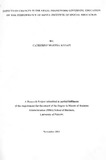| dc.description.abstract | Organizational performance comprises of the actual results of an organization as measured against its intended goals and objectives. External factors of a firm are always beyond it’s control therefore, influence the organizational choice of direction and actions so as to narrow the gap between actual and desired performance. The study was an attempt to find out the challenges of policy change and their effect to the performance of an organization with respect to Kenya National Examination Council (KNEC) evaluation criteria as introduced to Kenya Institute of Special Education (KISE) Special Needs Education (SNE) diploma curriculum.
Both primary and secondary data was collected. Primary data was collected from members of senior management using personal interviews while secondary data was collected from institute records. This data was mainly qualitative and descriptive. Considering regulations and stipulated requirements, change is expected to enhance efficiency and improvement in provision of quality products and services so as to serve the needs of both the organization and other stakeholders. Due to unforeseen problems that surface or ineffective implementation activities, the study shows that KISE suffered various challenges and threats in it’s persuit to implement the KNEC evaluation criteria which adversely affected the performance of the institution. There was a mismatch between KISE Unitary teaching curriculum and KNEC summative evaluation mode that created areas of possible conflicts in transition to higher learning institutions and effective placement of skills acquired in the market. The institute experienced delayed planning and coordination of programmes and activities under the Mercy of KNEC’s pace of communication; Mass failure of students in year 2009 almost compromised the prestige and monopoly of the Institute in SNE whose negative perceptions resulted to decreased enrolment, close down of some distance learning centres and exposure of the institute to fierce industry competitive forces. With dwindling revenue it was difficult to predict future performance for planning purposes and expansion of internal efficiencies and programmes so as to align the institute goals and new goals with outcome. However results revealed that the institute had laid down strategies by exploring other cost recovery modalities to maintain a sustainable competitive advantage in standards and quality of SNE programmes and materials. It also opted to explore other functions in the mandate and diversification of its programmes and activities. The study recommends that in order to avoid the risk of faulty change implementation, policy monitoring need to sensitize members and stakeholders on progress and expectations so as to capture and avert unplanned disruptions and unforeseen problems. | en_US |

